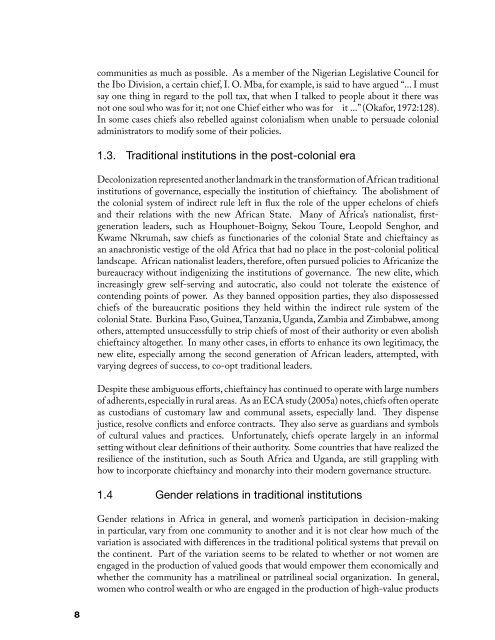Relevance of - United Nations Economic Commission for Africa
Relevance of - United Nations Economic Commission for Africa
Relevance of - United Nations Economic Commission for Africa
Create successful ePaper yourself
Turn your PDF publications into a flip-book with our unique Google optimized e-Paper software.
communities as much as possible. As a member <strong>of</strong> the Nigerian Legislative Council <strong>for</strong><br />
the Ibo Division, a certain chief, I. O. Mba, <strong>for</strong> example, is said to have argued “... I must<br />
say one thing in regard to the poll tax, that when I talked to people about it there was<br />
not one soul who was <strong>for</strong> it; not one Chief either who was <strong>for</strong> it ...” (Oka<strong>for</strong>, 1972:128).<br />
In some cases chiefs also rebelled against colonialism when unable to persuade colonial<br />
administrators to modify some <strong>of</strong> their policies.<br />
1.3. Traditional institutions in the post-colonial era<br />
Decolonization represented another landmark in the trans<strong>for</strong>mation <strong>of</strong> <strong>Africa</strong>n traditional<br />
institutions <strong>of</strong> governance, especially the institution <strong>of</strong> chieftaincy. The abolishment <strong>of</strong><br />
the colonial system <strong>of</strong> indirect rule left in flux the role <strong>of</strong> the upper echelons <strong>of</strong> chiefs<br />
and their relations with the new <strong>Africa</strong>n State. Many <strong>of</strong> <strong>Africa</strong>’s nationalist, firstgeneration<br />
leaders, such as Houphouet-Boigny, Sekou Toure, Leopold Senghor, and<br />
Kwame Nkrumah, saw chiefs as functionaries <strong>of</strong> the colonial State and chieftaincy as<br />
an anachronistic vestige <strong>of</strong> the old <strong>Africa</strong> that had no place in the post-colonial political<br />
landscape. <strong>Africa</strong>n nationalist leaders, there<strong>for</strong>e, <strong>of</strong>ten pursued policies to <strong>Africa</strong>nize the<br />
bureaucracy without indigenizing the institutions <strong>of</strong> governance. The new elite, which<br />
increasingly grew self-serving and autocratic, also could not tolerate the existence <strong>of</strong><br />
contending points <strong>of</strong> power. As they banned opposition parties, they also dispossessed<br />
chiefs <strong>of</strong> the bureaucratic positions they held within the indirect rule system <strong>of</strong> the<br />
colonial State. Burkina Faso, Guinea, Tanzania, Uganda, Zambia and Zimbabwe, among<br />
others, attempted unsuccessfully to strip chiefs <strong>of</strong> most <strong>of</strong> their authority or even abolish<br />
chieftaincy altogether. In many other cases, in ef<strong>for</strong>ts to enhance its own legitimacy, the<br />
new elite, especially among the second generation <strong>of</strong> <strong>Africa</strong>n leaders, attempted, with<br />
varying degrees <strong>of</strong> success, to co-opt traditional leaders.<br />
Despite these ambiguous ef<strong>for</strong>ts, chieftaincy has continued to operate with large numbers<br />
<strong>of</strong> adherents, especially in rural areas. As an ECA study (2005a) notes, chiefs <strong>of</strong>ten operate<br />
as custodians <strong>of</strong> customary law and communal assets, especially land. They dispense<br />
justice, resolve conflicts and en<strong>for</strong>ce contracts. They also serve as guardians and symbols<br />
<strong>of</strong> cultural values and practices. Un<strong>for</strong>tunately, chiefs operate largely in an in<strong>for</strong>mal<br />
setting without clear definitions <strong>of</strong> their authority. Some countries that have realized the<br />
resilience <strong>of</strong> the institution, such as South <strong>Africa</strong> and Uganda, are still grappling with<br />
how to incorporate chieftaincy and monarchy into their modern governance structure.<br />
1.4 Gender relations in traditional institutions<br />
Gender relations in <strong>Africa</strong> in general, and women’s participation in decision-making<br />
in particular, vary from one community to another and it is not clear how much <strong>of</strong> the<br />
variation is associated with differences in the traditional political systems that prevail on<br />
the continent. Part <strong>of</strong> the variation seems to be related to whether or not women are<br />
engaged in the production <strong>of</strong> valued goods that would empower them economically and<br />
whether the community has a matrilineal or patrilineal social organization. In general,<br />
women who control wealth or who are engaged in the production <strong>of</strong> high-value products
















